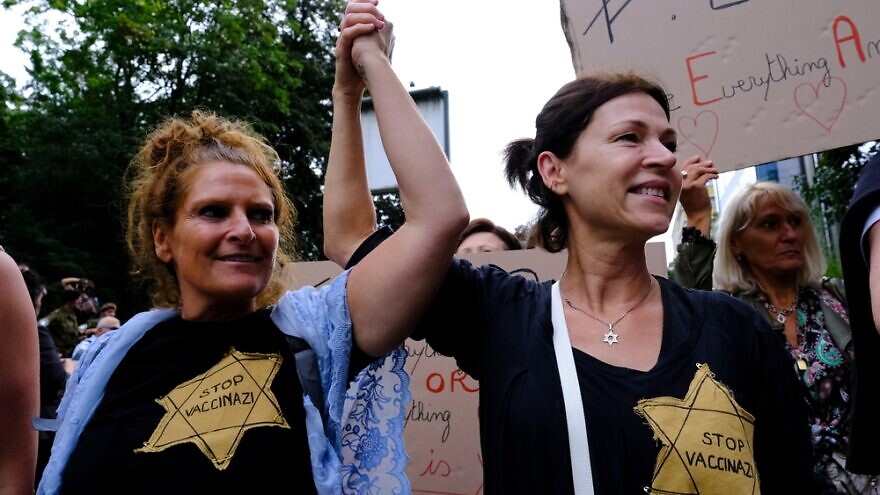“How can we as a society stand by and watch people die when a simple shot could prevent a life-threatening illness?” That was the agonized question asked by a group of nine health-care providers in Minnesota who last weekend took the unprecedented step of publishing an advertisement in local news outlets begging people to get vaccinated.
Alongside their plea was a stark warning about the strains—mental, physical, infrastructural—on the health workers and their institutions that have weathered the COVID-19 pandemic for two years now. “Care in our hospitals is safe but our ability to provide it is threatened,” the ad stated. “Heart attacks. Car accidents. Cancer. Stroke. Appendicitis. Now an ominous question looms: Will you be able to get care from your local community hospital without delay? Today that’s uncertain.”
The social costs of the ongoing pandemic are similarly acute, in large part because advocates of vaccine refusal have adopted the mantle of victimhood and falsely claim that they are being discriminated against. Many cities and countries now require some form of vaccine passport, which can mean that for public-health reasons, those who refuse the vaccine are no longer eligible for certain jobs, cannot travel on public transport, cannot enter restaurants, cinemas and other places of entertainment, and so on.
Successive studies have shown that upwards of 75 percent of the U.S. population needs to be vaccinated in order to achieve herd immunity from COVID. At the moment, our vaccination rate nationally lags at a little less than 62 percent—meaning that pressure on the hospital system will continue to mount since the latest, highly transmissible strain of the coronavirus, Omicron, can only be considered mild or non-lethal in persons who are vaccinated. Hence, the impassioned pleas in Minnesota that have echoed around country urging those who are not vaccinated to do the right thing.
Will an attempt to nudge people into action through an appeal to conscience have the desired effect, two years into the pandemic and nearly one year since the vaccines became available? There are many observers who regretfully believe that it won’t, and that a frankly baser approach needs to be tried.
That approach would involve paying financial incentives—bribes, if you prefer—to those who are presently reluctant to get the vaccine. As radical an idea as that is, some variations of it have already been rolled out by some state and national governments and private corporations. In Baltimore, government workers who can show fully vaccinated status by Jan. 14 will receive a one-time $1,000 payment. In New York City during December, a booster shot at authorized clinics carried a $100 reward with it. There was a similar deal in Louisiana during the same period, with a reported 34,000 vaccinated patients receiving a $100 gift card as a reward for taking the vaccine plunge.
Meanwhile, fully vaccinated employees of Walmart are entitled to a $150 bonus. Further afield, in the sorely under-vaccinated central European nation of Slovakia, those aged 60 and over who get fully vaccinated will pick up a cash reward of just under $350, thanks to legislation passed by the Slovak parliament in early December.
All of these examples that I’ve cited represent merely a handful of the various schemes in existence that tie some form of payment to the attainment of vaccinated status. Even so, a national program that is targeted at all unvaccinated individuals irrespective of their demographic and that offers the same amount of money to anyone who agrees to become verifiably vaccinated is nowhere to be found.
Perhaps that’s because such a scheme carries enormous risks with it, especially for the politicians who would have to explain and justify it. The objections are obvious. Is it right? Have we really sunk so low that we now bribe those whom we fail to persuade? Is it fair? Why would we reward the holdouts while waving away those among us who freely did their civic duty? Would it even work? Although there have been some encouraging small-scale studies of the effectiveness of payments, there is hardly an overwhelming body of evidence out there to allow policymakers to confidently conclude that a vaccine incentive would persuade the vast majority of refusers to change their minds.
Yet some politicians, among them former Democratic presidential candidates John Delaney and Andrew Yang, have been pushing financial-reward schemes for those who get vaccinated for a year or more. Robert Litan, an economist with the Brookings Institution, argued at the end of 2020 that the sum of $1,000 would be an enticing recompense, and that the approximately $250 billion he believes such a scheme might cost is a small price to pay for reactivating our national economy and cultural life. According to Litan, anyone who objects to such an idea is “effectively saying that it is better for the nation to continue to suffer from the fear and the cost of the virus than to pay a modest sum to end this national nightmare. Framed as a cost-benefit assessment, the payment, if needed, is a no-brainer.”
While I wouldn’t share that confidence in a vaccine payment scheme, I have reluctantly concluded that a grander, aggressively marketed program on a national scale offering a significant financial reward in exchange for vaccinated status is worth, if you’ll excuse this awful pun, a shot.
That’s because the costs of allowing this pandemic to drag on are greater than any discomfort with the admittedly immoral act of resorting to legally sanctioned bribery.
There are millions of people with illnesses and long-term conditions far graver than COVID-19 whose treatment is being compromised because of the pandemic’s demands. Moreover, the poisoning of our society’s discourse with pseudo-scientific claims and conspiracy theories—often rooted in medieval prejudices about Jews—is destroying trust in education, in government and worst of all, in each other.
Those anti-Semitic prejudices will, of course, linger long after COVID-19 has been banished, but they will be far less virulent in conditions where a pandemic is no longer raging. If ending the collective misery that the coronavirus has wrought upon us is our most important national priority, we should be willing to give the unthinkable a try.

























